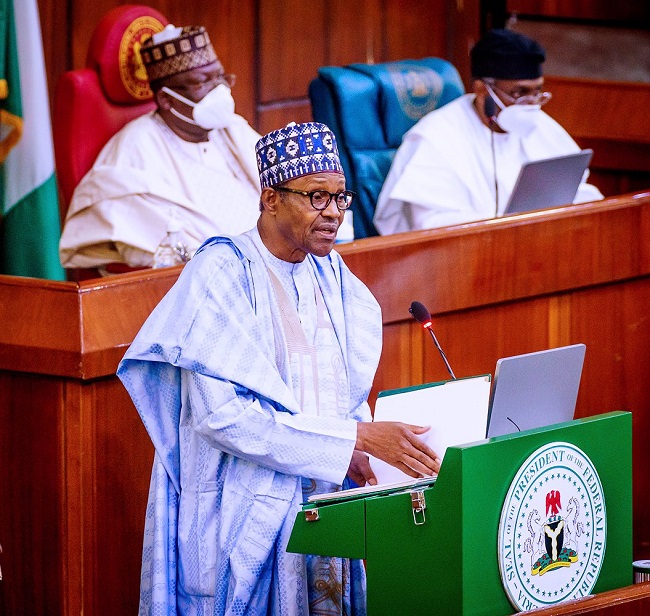President Muhammadu Buhari on Friday presented N20.51 trillion total expenditure estimates comprising of N10.78 trillion fiscal deficit representing 4.78 per cent of estimated GDP, above the 3 per cent to the joint session of the National Assembly.
The budget proposal is N75 billion above the N19.76 trillion approved by the Senate and House of Representatives in the Medium Term Expenditure Framework (MTEF) and Fiscal Strategy Paper (FSP) passed on Wednesday and Thursday by both chambers.
A breakdown of the 2023 budget parameters and fiscal assumptions, showed that the $70 oil price benchmark; 1.69 million barrels (inclusive of condensates of 300,000 to 400,000 barrels per day) daily oil production; N435.57/$ Exchange rate; 3.75 per cent Projected GDP growth rate and 17.16 per cent inflation rate.
The proposed N20.51 trillion 2023 expenditure comprises Statutory Transfers of N744.11 billion; Non-debt Recurrent Costs of N8.27 trillion; Personnel Costs of N4.99 trillion; Pensions, Gratuities and Retirees’ Benefits of N854.8 billion; Overheads of N1.11 trillion; Capital Expenditure of N5.35 trillion, including the capital component of Statutory Transfers; Debt Service of N6.31 trillion; and Sinking Fund of N247.73 billion to retire certain maturing bonds.
According to him, based on these fiscal assumptions and parameters, total federally-collectable revenue is estimated at N16.87 trillion; total federally distributable revenue is estimated at N11.09 trillion in 2023, while total revenue available to fund the 2023 Federal Budget is estimated at N9.73 trillion including the revenues of 63 Government-Owned Enterprises.
“Oil revenue is projected at N1.92 trillion, Non-oil taxes are estimated at N2.43 trillion, FGN Independent revenues are projected to be N2.21 trillion; other revenues total N762 billion, while the retained revenues of the GOEs amount to N2.42 trillion.
The 2023 Appropriation Bill aims to maintain the focus of MDAs on the revenue side of the budget and greater attention to internal revenue generation. Sustenance of a revenue diversification strategy would further increase the non-oil revenue share of total revenues.
A breakdown of the proposed expenditures showed of N20.51 trillion is proposed for the Federal Government in 2023. This includes N2.42 trillion spending by Government-Owned Enterprises.
Total fiscal operations of the Federal Government to result in a deficit of N10.78 trillion, representing 4.78 per cent of estimated GDP, above the 3 per cent threshold set by the Fiscal Responsibility Act 2007.
As envisaged by the law, we need to exceed this threshold considering the need to continue to tackle the existential security challenges facing the country.
We plan to finance the deficit mainly by new borrowings totalling N8.80 trillion, N206.18 billion Naira from Privatization Proceeds and N1.77 trillion drawdowns on bilateral/multilateral loans secured for specific development projects/programmes.
Details later…
ALSO READ FROM NIGERIAN TRIBUNE






